#languages.eu
Photo
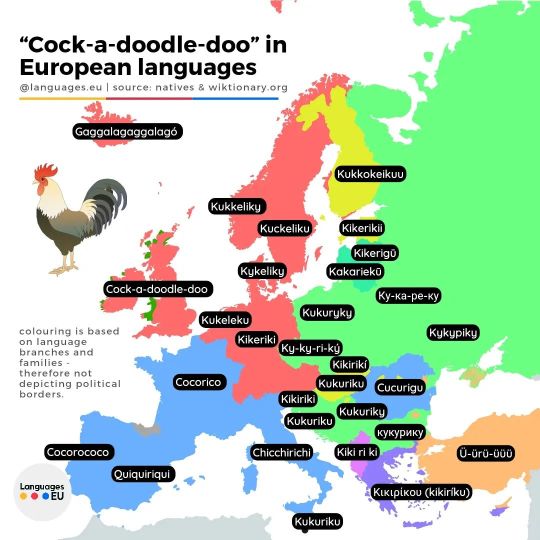
“Cock-a-doodle-doo” in various languages spoken in Europe
by languages.eu
37K notes
·
View notes
Text
the languages.eu account annoys the fuuuuuck out of me. theyve been commented time and time again abt including minority languages and they literally just dont care!!! i would beat their ass so bad if i could
#apparently someone called them out on not including aragonese anywhere and they replied that it wasnt an important enough language#like. LMAO? GIRL???????#z xarre
8 notes
·
View notes
Photo
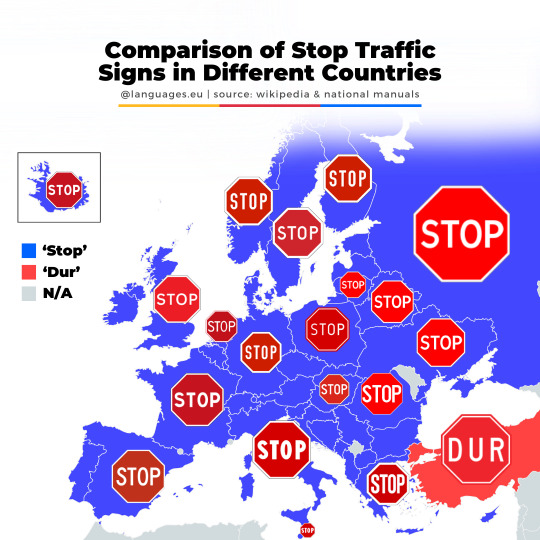
Stop sign in different Europen countries.
by languages.eu
Countries in Europe have stop signs with the text STOP, regardless of local language. There were some objections to this when introduced around the 1970s, but now this is accepted. 🚏 Follow for more language content!
496 notes
·
View notes
Photo
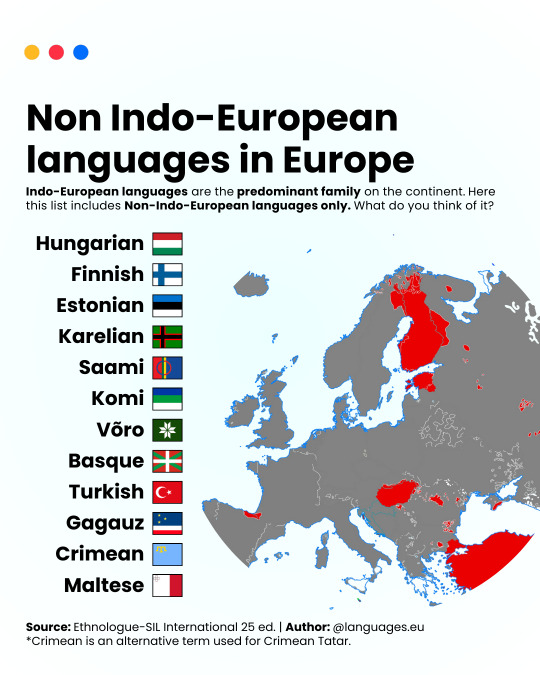
Non Indo-European languages in Europe
Of the approximately 45 million Europeans speaking non-Indo-European languages, most speak languages within either the Uralic or Turkic families. Still smaller groups — such as Basque (language isolate), Semitic languages (Maltese, c. 0.5 million), and various languages of the Caucasus — account for less than 1% of the European population among them. Komi Republic is not located necessarily in Europe, the language is spoken in Nurmansk as well. Therefore, it appears in the list! This list mostly highlights the majority languages. Most of other Non-Indo-European languages are extinct or almost extinct in Europe.
by languages.eu
458 notes
·
View notes
Photo
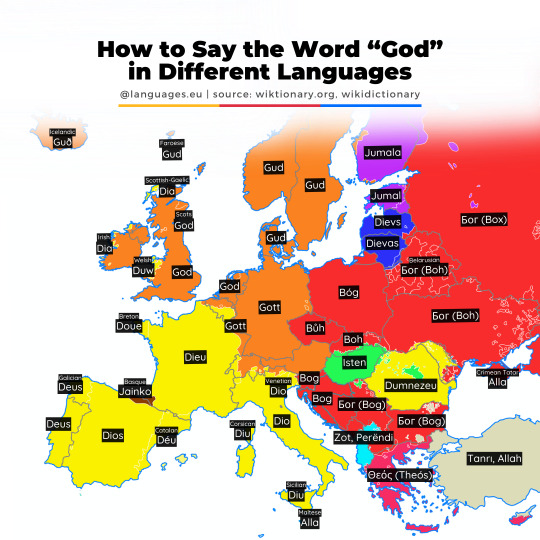
How do you say "God" in European languages?
In Old English, it was also "God"! Originally neuter, then changed to masculine to reflect the change in religion to Christianity.
by languages.eu
261 notes
·
View notes
Photo
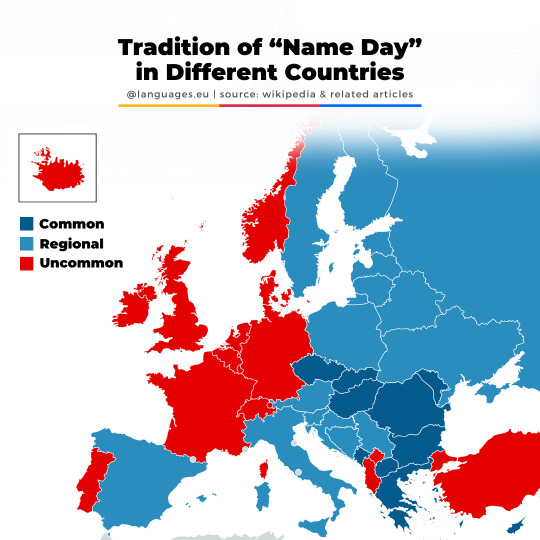
Tradition of "Name Day" in Different Countries
by languages.eu
Name Day is a celebration of an individual's given name and has been a tradition in many cultures for centuries. For example, according to the Swedish name day list, today — February 5, it's the name day for Agata/Agda. Tomorrow it's for Dorotea, Doris, and so on.
It consists of celebrating a day of the year that is associated with one's baptismal name, which is normatively that of a biblical character or other saint. Where they are popular, individuals celebrate both their name day and their birthday in a given year. It has become less popular nowadays in certain countries and only grandparents celebrate the name days of their grandchildren.
Name Day tradition is a common practice in France 🇫🇷 even though it isn’t celebrated the same way as in other coloured countries above.
Historically, this was a tradition in all regions of Europe practicing Christianity, including Germany, Ireland, Denmark, and so on.
223 notes
·
View notes
Photo

Minority Languages of Europe.
by languages.eu
916 notes
·
View notes
Photo

Term for "Computer" in Different Languages
by languages.eu
Many languages such as Russian and Ukrainian borrowed the word from English computer, which comes from Latin computare meaning calculate. Moreover, the Balkan and some other languages have terms from other words relating to calculation or counting such as Romanian calculer, Icelandic tal (number), Hungarian szamit (count), and so on.
When it comes to the French, Galician, Spanish, Basque, and Catalan terms, they all come from French ordinateur or directly from Latin ordinare (put in order). Terms in many Northern languages are related to data or information such as Norwegian (data + maskin "machine"). The Turkish term is a compound of bilgi (information) + sayar (counter) and therefore is something between the colours navy blue and dark red here.
199 notes
·
View notes
Photo

The word November in European languages.
by languages.eu
327 notes
·
View notes
Photo
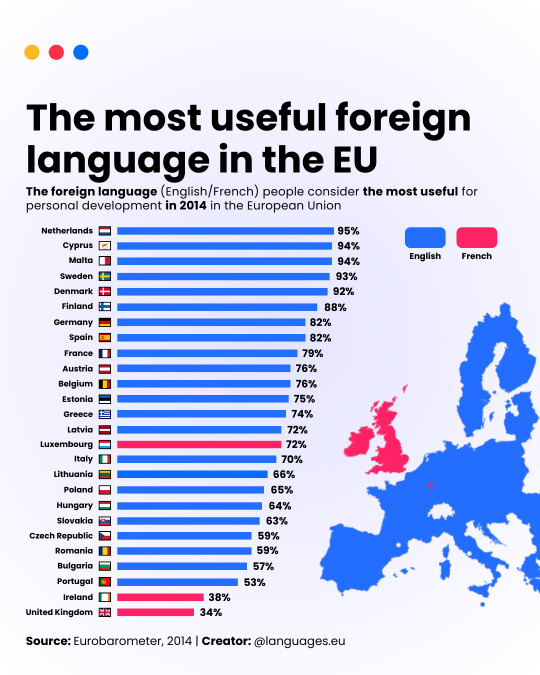
The foreign language people consider the most useful for personal development in the European Union
The European Union (EU) has 24 official languages, of which three – English, French and German – have the higher status of "procedural" languages of the European Commission (whereas the European Parliament accepts all official languages as working languages). The EU asserts that it is in favour of linguistic diversity. Luxembourg is the only non-English speaking country that ranked a different language than English as the most useful foreign tongue to master.
by languages.eu
175 notes
·
View notes
Photo
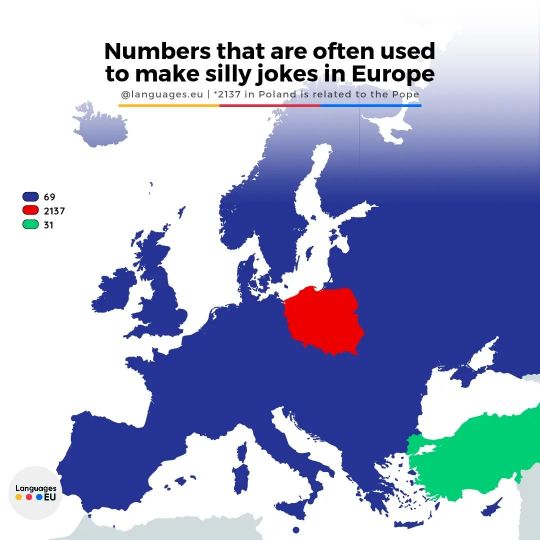
Numbers that are used to make silly jokes in Europe
Poland: A meme that is probably very popular in Poland related to Pope John Paul's II death, which occurred at 9:37 pm Polish time which is 21:37 using 24 hour system. 🇵🇱 Italy: Some people also stated that there’s 104 in Italy, but no info about that.
by languages.eu
332 notes
·
View notes
Photo

Common Personal Name Order in Different European Countries
by languages.eu
387 notes
·
View notes
Photo

The word for "Almond" in European languages.
🔵 Blue comes from Vulgar Latin *amendla, *amandula, from Latin amygdala, from Ancient Greek ἀμυγδάλη (amugdálē), of uncertain origin.
🔴 Red is borrowed from Ottoman Turkish بادم (badem), from Persian بادام (bâdâm).
🟢 Green (only Maltese) comes from Arabic لَوْز (lawz).
by languages.eu
147 notes
·
View notes
Photo

Countries where German is the official language.
by languages.eu
German is a West Germanic language mainly spoken in Western Europe and Central Europe.
It is the most widely spoken and official or co-official language in Germany, Austria, Switzerland, Liechtenstein, and the Italian province of South Tyrol. It is also an official language of Luxembourg and Belgium, as well as a recognized national language in Namibia.
Outside Germany, it is also spoken by German communities in France (Alsace), Czech Republic (North Bohemia), Poland (Upper Silesia), Slovakia (Košice Region, Spiš, and Hauerland), and Hungary (Sopron).
157 notes
·
View notes
Text

Onomatopoeias: Sneeze & Drinking.
by languages.eu
397 notes
·
View notes
Photo

December in European languages
by languages.eu
Why is it called December? December got its name from the Latin word decem (meaning ten) because it was originally the tenth month of the year in the calendar of Romulus c. 750 BC which began in March. The winter days following December were not included as part of any month.
Polish grudzień and Ukrainian hrúden’ are derived from a common Slavic root gruda, meaning a “heap” or “lump”. Belarusian snjéžan’ means “snow month”.
Irish Nollaig comes from Latin nātālīcius, “birthday”. Welsh Rhagfyr literally means “foreshortening”, referring to the days shortening. Scottish Gaelic Dùbhlachd is derived from dubh, “black”. Similarly, Breton Kerzu means “very black”.
Turkish aralık means “passageway” or “interval”. Finnish joulukuu literally means “Yule month” (or “Christmas month”). Basque abendu come from Latin adventus, “arrival”.
129 notes
·
View notes